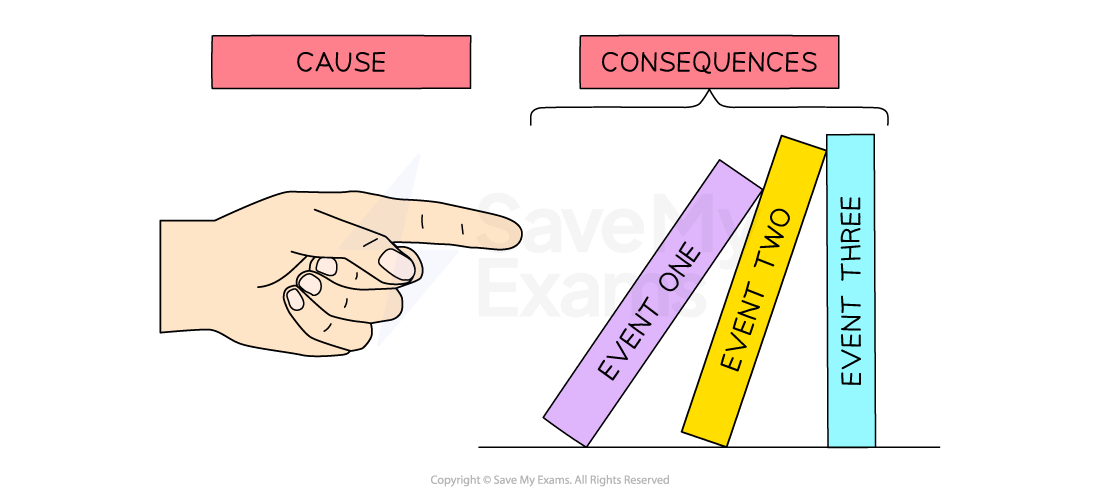The 4 Mark "Explain One Consequence of" Question (Edexcel GCSE History): Revision Note
Exam code: 1HI0
Summary of Question 1
Question 1 requires you to explain a consequence of a historical event
This question has changed format since 2024
Previously, you were asked to explain two consequences of one event
Now, you have to explain one consequence of two given events, separated into Question 1 (a) and Question 1 (b)
Amount of marks | 8 (2 x 4 marks) |
|---|---|
The time that you should spend on the question | No more than 10 minutes |
An example of the type of question you may encounter can be seen below:

In previous years, this question has focused on the following topics from Conflict in the Middle East:
Year of Exam | Question Topic |
|---|---|
2018 | Territorial changes following the 1948–49 Arab–Israeli war (opens in a new tab) |
2019 | The Oslo Accords (1993) (opens in a new tab) |
2020 | The Palestinian Intifada (1987–93) (opens in a new tab) |
2021 | No paper available |
2022 | Syria’s support for Fatah, 1964–67 (opens in a new tab) |
2023 | The terrorist attack at the Munich Olympics (opens in a new tab) |
2024 | President Sadat of Egypt’s visit to Israel (1977) |
How to explain consequences
Cause and consequence is a second-order concept
Causes and consequences are like falling dominoes
The causes are what push the dominoes over
For the example question, a cause of the Suez Crisis was Nasser's decision to nationalise the Suez Canal
The consequences are the other dominoes that fall
For the example question, a consequence of the Suez Crisis was a loss of revenue for Britain

Consequence
A consequence in history is something that has happened in response to the cause
Consequences can be:
Different depending on the person
For example, the consequences of the Suez Crisis were different for Egyptians than for the British government
Short- or long-term
Both positive and negative
Use causation connectives such as:
"Due to …"
"As a result …"
"Consequently … "
"Explain one consequence of" question structure
Your answer should consist of:
Specific and relevant knowledge
A developed and well-explained consequence of the event or issue
Your answers could be written in PEE paragraphs:
P — Make a point by writing a consequence of the event in the question
E — Include evidence to support the point you have made (K)
Focus on key knowledge about the event in the question
E — Explain the question (SOC)
Focus on the key demands of the questions
Include a complex explanation showing your understanding of cause and consequence
To achieve full marks, you need to answer both Questions 1 (a) and 1 (b). The questions are on two different events
Each consequence question is worth 4 marks
2 marks for knowledge (K)
2 marks for your analysis of the second-order concept of consequence (SOC)
8 marks are available for answering both parts of Question 1
Worked example of an "Explain one consequence of" question
Worked Example
1 (a) Explain one consequence of the Suez Crisis (1956).
(4)
Answer:
One consequence of the Suez Crisis was the humiliation it brought to Britain and France (SOC). In 1956, they joined Israel in attacking Egypt after Nasser nationalised the Suez Canal. The US and the USSR both opposed the invasion, and the US pressured Britain and France to withdraw (K). As a result, Britain and France were no longer superpowers, and the US became more dominant in Middle Eastern affairs (K). Therefore, the Suez Crisis showed that Britain and France lacked the military power they once held, which made them seem weaker than other countries (SOC).

Unlock more, it's free!
Was this revision note helpful?